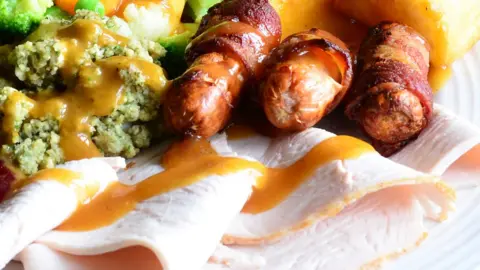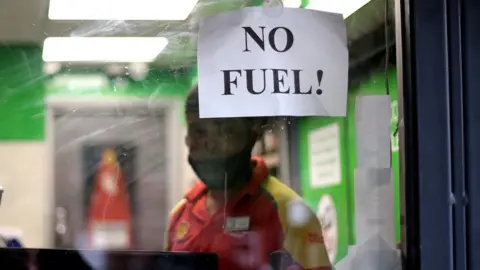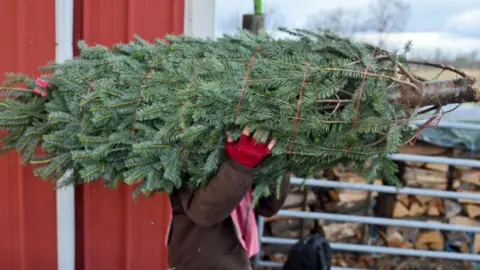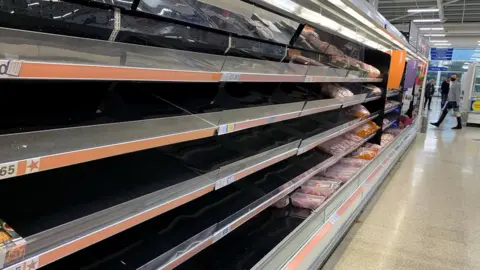Shortage problem: What's the UK running low on and why?
 Getty Images
Getty ImagesShortages are the only thing we don't seem to be running out of in the UK right now.
If you can manage to buy a car, then you might have trouble filling it with petrol, although there are signs that the fuel supply crisis is easing.
Drive to the shops, though, and you might find you can't get all the groceries you want.
Christmas is coming, but times are getting lean: chocolates and pigs in blankets could be hard to find, just like toys, turkeys and trees.
Here's a list of some of the worst shortages and the reasons for them.
Cars and petrol
Let's start with one that has an easy explanation. Global vehicle production has been hit by a shortage of microchips.
Now that every new car is practically a computer on wheels, semiconductor chips are essential to keeping those production lines running.
But during the coronavirus pandemic, carmakers shut down, so microchip manufacturers diverted the chips that would normally go into those cars to the consumer electronics market.
With fewer new cars for sale, sought-after second-hand motors have shot up in price. And car industry figures say the supply crisis is unlikely to end soon.
Earlier this month, Ola Källenius, the head of Germany's Daimler and Mercedes-Benz, told the BBC that the chip shortage could continue into 2022 and even 2023.
 Reuters
ReutersAs for petrol, the government has been keen to stress that there never was an actual shortage of petrol in the UK - there were just problems with getting it from the refineries to the petrol stations.
Those were caused by a shortage of heavy goods drivers to make deliveries, with the coronavirus pandemic, Brexit and tax changes all contributing to a lack of qualified drivers. Industry bodies estimate there is a shortfall of about 100,000.
But the Petrol Retailers Association (PRA) now says availability has improved in London and the South East, where fuel was hardest to come by.
Toys and tech
In the run-up to Christmas, there is always a mad rush by parents to secure the latest must-have toy for their offspring.
But this year, the hunt is likely to be even more frustrating, especially for kit that involves cutting-edge technology.
For instance, the same chip shortage that is curbing car supplies has been keenly felt by video gamers desperate to get their hands on Sony's PlayStation 5 console.
 Getty Images
Getty ImagesThe device has been hard to find all year. In theory, it retails at £449, but it is out of stock everywhere and can occasionally be glimpsed commanding far higher prices online.
The PlayStation, along with about 70% of the world's toys, is made in China - and the cost of getting supplies to the UK has gone up hugely.
Containers are scarce in Asia, because of the effects of the pandemic on international supply chains, so shipping charges are now 10 times higher.
And if you can find containers, shipping times have doubled, meaning there is less time available to get toys into shops before the festive season.
The Toy Retailers Association has said shoppers may struggle to find what they want, while John Lewis says it is chartering a fleet of extra ships to make sure it has Christmas stock on time.
One of the UK's biggest toy retailers, The Entertainer, is warning that delays at UK ports will result in shortages this Christmas, because it will be harder to get stock to the right places at the right time.
Barbie dolls and Paw Patrol toys are among the children's favourites that the firm expects to sell out fast.
Turkeys and trees
The poultry trade is also hard hit by the labour shortage, with the British Poultry Council estimating there are nearly 7,000 vacancies across the sector.
Farmers are warning of a Christmas turkey shortage because visa changes to allow labour recruitment from abroad have come too late.
And the "perfect storm" of labour shortages, shipping costs and post-Brexit labour regulations could also lead to a scarcity of Christmas trees this year.
 Getty Images
Getty ImagesAccording to the British Christmas Tree Growers Association, between eight and 10 million real trees are sold in the UK each year.
But between one million and three million of those are imported from elsewhere in Europe.
Now those supplies could be set for the chop, pushing up prices for home-grown trees.
Chocolates and milk
The UK's shortage of lorry drivers means that supermarkets are getting fewer deliveries of everything than they used to, so when they sell out of a particular product, it now takes longer for them to fill that gap on the shelf.
That includes chocolate and other confectionery.
Large quantities of sweets are an essential indulgence for many families at Christmas, but some of the most popular selections might be absent from store shelves in the run-up to the festive season.
Nestle, which makes Quality Street as well as Aero and KitKat, has said it is experiencing some supply chain problems - again caused by the UK's shortage of HGV lorry drivers and global shipping issues.
The Swiss-based multinational is the world's largest producer of dairy products, but it's not the only firm in its sector that has been hit.
Dairy giant Arla, which supplies milk to all major UK supermarkets, has been forced to cut back on its deliveries by the lack of lorry drivers.
The firm has been experiencing driver shortages since early April and there is no end in sight to the problem.
It normally delivers to 2,400 stores a day, but now cannot deliver to all of them every day.
However, it says it is working closely with customers to make sure supplies get through.
At the same time, at least one dairy farmer has said he was told to dump his milk after the lorry driver shortage meant it could not be collected.
Meat
Among other grocery items sometimes missing from supermarket shelves right now, shoppers are finding they can't always buy their favourite cuts of meat.
Since the UK's departure from the European Union, the food sector, like many others, has been struggling to cope with a loss of workers after many eastern Europeans went home.
Pig farmers have been particularly badly affected - they say they are worried they will not be able to sell their animals this year, because of staff shortages in abattoirs.
Farmers have told the BBC they have slaughter-ready pigs waiting to be sent to butchers.
However, a lack of trained staff to turn the pigs into food for customers means some risk being killed and sent to landfill instead.
And not only is there a problem with pork supply, but the production of pigs in blankets - cocktail sausages wrapped in bacon - is suffering from a lack of seasonal EU labour.
 Reuters
ReutersA number of food industry bodies have warned of panic-buying this Christmas unless action is taken to address those labour shortages.
They include the British Meat Processors Association (BMPA), which says it has traditionally found it difficult to attract British workers.
A BMPA spokesperson told the BBC that labour shortages were "perennial", but added: "Since Brexit and following the pandemic, the problem has become much worse.
"Industries are now competing with each other for a dwindling pool of workers and the current labour crisis has seen workers in strategically important sectors like food manufacture and social care being enticed away by other sectors that can afford to hike wages 20% or 30%.
"To restore some balance in the labour market, every employer, including the public sector, may have to follow suit, but it will mean consumer price inflation."
DIY and home furnishings
Building materials have been running short in the UK, leaving DIY projects in doubt and putting construction firms under pressure.
Timber prices in particular have been soaring, pushed up by shipping issues, supply chain problems and post-Brexit import rules.
Meanwhile, supplies of cement, plasterboard and insulation are being rationed by manufacturers, according to builders' merchant Jewson.
Despite the supply squeeze, the UK construction industry is literally building back after the worst of the pandemic, but the shortages are leading to massive delays and significant price rises.
One builder told the BBC that a home extension previously costing £20,000 currently costs about £26,000.
But maybe your home is already big enough for you and you just want some new furniture. Even there, you could be out of luck.
Ikea, the world's biggest furniture company, sources a quarter of its products from China, while raw materials for its furniture are also running short.
So it too is facing supply chain problems, which it expects to continue into next year.
